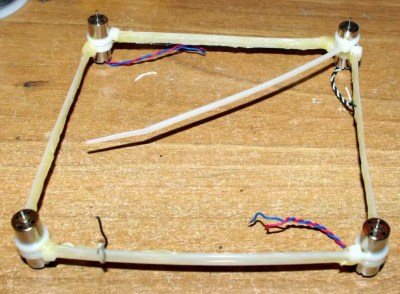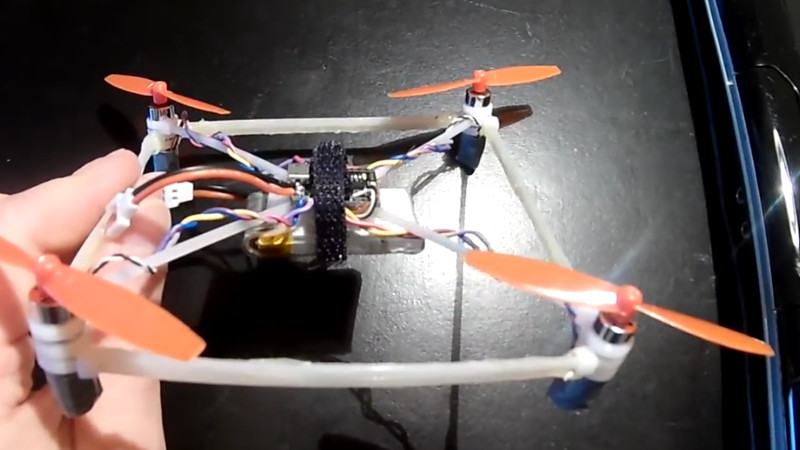We’ve seen some cheap quadcopter builds over the years, but this one takes the cake. After seeing somebody post a joke about building a quadcopter frame out of zip ties and hot glue, [IronMew] decided to try it for real. The final result is a micro quadcopter that actually flies half-way decently and seems to be fairly resistant to crash damage thanks to the flexible structure.
 The first attempts at building the frame failed, as the zip ties (unsurprisingly) were too flexible and couldn’t support the weight of the motors. Eventually, [IronMew] realized that trying to replicate the traditional quadcopter frame design just wasn’t going to work. Rather than a body with arms radiating out to hold the motors, the layout he eventually came up with is essentially the reverse of a normal quadcopter frame.
The first attempts at building the frame failed, as the zip ties (unsurprisingly) were too flexible and couldn’t support the weight of the motors. Eventually, [IronMew] realized that trying to replicate the traditional quadcopter frame design just wasn’t going to work. Rather than a body with arms radiating out to hold the motors, the layout he eventually came up with is essentially the reverse of a normal quadcopter frame.
Zip ties reinforced with a healthy coating of hot glue are arranged into a square, with a motor at each corner. Then four zip ties are used to support the central “pod” which holds the battery and electronics. No attempt is made to strengthen this part of the frame, and as such the heavy central pod hangs down a bit in flight. [IronMew] theorizes that this might actually be beneficial in the end, as he believes it could have a stabilizing effect when it comes time to record FPV video.
He mentions that he’s still struggling to get the PID values setup properly in the flight computer, but in the video after the break you can see that it’s flying fairly well for a first attempt. We wouldn’t recommend you tear into a bag of zip ties when it comes time to build your first quadcopter, but it does go to show that there’s plenty of room for experimentation.
We’ve covered a number of unique quadcopter frames if you’re looking for something to set your next build apart from the rest. If you’ve got a big enough bed you can 3D print a very nice frame, but if you’ve got more time than equipment, you could always cut one out of a piece of plywood.

















Wow, so it’s that easy to build something like this these days… Maybe even someone like me could give it a shot for giggles.
It’s amazing what these flight controllers are capable of at this point. Within reason, the design doesn’t need to even be symmetrical. The controller will pick up the discrepancy and compensate for it automatically.
Reminds me of this project from a few years back. Just stick motors to whatever you want, and off you go:
https://hackaday.com/2013/07/08/turning-anything-into-a-drone/
It really is amazing. This guy built a quad with four different motors, four different ESCs (running different firmware to boot) and four different propellers, and the damn thing just flew as if nothing was out of the ordinary: https://www.youtube.com/watch?v=-sXnhjgPsC4
And as for weird asymmetrical designs, it doesn’t even need to be within reason – as long as it can maintain sufficient thrust on all sides, you can basically build it however the hell you want: https://www.youtube.com/watch?v=qqgHLRqDkYA
I just read a thing on a tinywhoop facebook page where they’re changing the configuration of the layout, so it’s a “cross shape” flying along two motor axes. Same motors, frame and FC (beecore IIRC), some adjustment to the FPV camera, the rest is all done in Betaflight. Back up the original settings, hack away and see what happens. Worst case is you make an unflyable setup and have to reload and start over. I love these new FCs
It’s a hack!
frame flex is really a unique problem for control.
i wonder how much weight in hot melt glue went into this. :)
Not very much – I kept the layer quite narrow as I didn’t want huge blobs of melt glue unbalancing everything. I actually thinned it down with the side of the glue gun’s nozzle to keep it more-or-less level.
Drinking straws filled with glue would stiffen up the frame.
…and slide over the zip ties…
(It was clear in my mind????)
I don’t think you could fill them with melt glue. As you pumped it in the glue furthest from the gun’s nozzle would solidify and you’d just end up with glue overflowing from the straw after only filling it up partially. You’d need some other kind of adhesive to do this – preferably something that doesn’t need air to cure, since it’d have to do so in a sealed environment – and I don’t have any such advanced adhesives. As well, a glue-filled straw would be quite heavy.
How about using Heat shrink tubing that has a “hot glue” inside it?
What about a hot-glue gun with a long nozzle?
gorilla glue expands like “great stuff” foam, either one might work with straws
Get them quick before they are banned !
At that point might as well use cheap chinese takeout chopsticks for framing.
Bonus: Chinese takeout
Too extreme. Bend Aluminum wire frame and glue/screw it to motors. His hot glue layer is even heavier than any metal frame.
“His hot glue layer is even heavier than any metal frame.”
It isn’t. The layer is quite thin and the whole quad – with a battery and a camera – weighs a grand total of 53 grams: http://i.imgur.com/aDfThV2.jpg
Which is, give or take, the same weight a as a stock Eachine QX90: http://img.eachine.com/eachine/products/original/201608/1470553297_17.jpg
The QX90 uses the same motors but smaller propellers, and there is more airflow interference from the arms. Which means that, if I can reach such a thing as a stable tune, my tiny abomination ought to *significantly* outperform a QX90. Mind you, I leave open the possibility that the bendy frame might never actually allow for stable flight to happen at all, but I have to test further before making any claims one way or the other.
As for your idea, aluminium wire would bend with functionally no effort under the smallest impact, and – in contrast to zipties – wouldn’t snap back to its original shape.
“tensegrity quadcopter” search returns nothing that would fit that description.
My thoughts too.
Why try to redesign an element optimized for tension to work in compression when you can use this ‘weakness’ to its strength?
Hey there, I’m the one who built this quadcopter. As a long time Hackaday reader (how long? Well, when I started the pictures in the main page were still in black and white…) I’m so glad to finally have an article written about something I made!
The frame has survived several crashes with no damage (so far). I really need to tune it – though I’m not much good with anything that involves numbers, so it might take me a while to get the PIDs right.
I expect the most likely points of failure are the four glue blobs that hold the flight controller to the supporting arms. Fortunately enough, they aren’t hard to fix should they let go. :)
Feel free to ask anything here or on reddit, I’m open to constructive criticism and suggestions (some may call them challenges…) over what to use for my next frame. :D
What is the weight?
Do you think it could be scaled with larger or smaller zip-ties?
What was the cost of the overall drone?
Around 55 grams, give or take: http://i.imgur.com/aDfThV2.jpg (the scale is not very precise and I’ll need some glue to affix the camera, hence the rounding). Functionally the same weight as a stock QX90 – which, notably, uses smaller propellers.
The cost was very cheap: aside from the frame, whose cost is effectively irrelevant, the parts came from when Banggood did a flash sale for QX90 quadcopters; they went from $60 to $25 and I bought four to stock up on parts – at the time I only needed the flight controller, but the difference between buying four special-deal full quadcopters and four full-price controllers was only a few dollars, so I went for it and ended up with a ton of parts. At full current prices you’d pay $15-20 for the controller, $3 or so for the battery, $5 for the motors (Fasttech has them cheaper than Banggood) and a buck or two for the propellers.
I imagine you could upscale, but you’d also have to upscale the powerplant, which would mean going brushless – 8.5mm motors like these are the largest brushed motors it makes sense to buy; there do exist larger 10mm ones as well as upgraded 8.5mm ones, but they are quite expensive and don’t have *that* much more thrust. Going brushless would add significant challenges: you’d need somewhere to put the ESCs, for starters, and since the motor’s casing spins you couldn’t tighten the zipties around them like I did here so you’d need to come up with some kind of zip-tiable motor mount.
Or just buy a tiny whoop frame for like 10 bux
Yeah, because that’s definitely the point.
Why even bother to comment with nonsense like this?
sometimes you gotta have something to fly when you’re waiting for a replacement frame to come in. Especially when you’re a crappy pilot like me :P
Ive seen the cardboard box quad, that was built out of the box the guy’s new FC board came in, while he was waiting for the replacement frame to come in. Flew like @ss but it sorta worked. With more cutting probably wouldve flown better for a few minutes before something creased.
I love the build. Zip-ties for the win! But the “low-hanging” mass won’t help with stabilization, that’ll be up to the flight controller…
https://youtu.be/hfss7nCN40A?t=6m39s